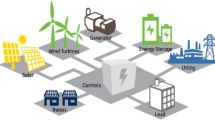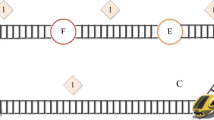Abstract
This article discusses a Whale Optimization (WO) controller for design analysis, stability management, application, and performance analysis of a deregulated two-area multi-source energy system. Within the power grid, the Automatic Generation Control (AGC) maintains the power balance and strengthens the sudden frequency disturbance of the grid. Various researchers are targeted many kinds of fast-acting energy-storing devices to dampen space frequency oscillations and diversion of the tie line because of unexpected load variation. To regulate the power flow between multi-areas, load frequency control (LFC) is used by keeping frequency constant. But, to design a controller for minimizing the issues of LFC remains a challenge within the deregulated atmosphere. The main objective of the proposed methodology is to design a controller for minimizing the issues in LFC within the deregulated atmosphere. A two-area deregulated hydrothermal power system is employed to analyze many LFC problems in the deregulated power grid. During this modeling, the Thyristor-Controlled Phase Shifters (TCPS) and Capacitive Energy Storage unit (CES) are placed in the tie line and its control space. To mitigate the various issues of LFC in a two-area deregulated hydrothermal power system, the CES–TCPS combination is placed between the two control areas and the transient performance of constant is evaluated. The WO controller will increase the system power size to focus on the better performance of low-frequency management tasks. In addition, the effectiveness of the WO algorithm in tuning the proportional integral controller is also compared in a different contract (unilateral, bilateral and contract violation cases) scenarios of the proposed deregulated power system. Finally, the simulation is carried out in MATLAB/Simulink platform and the results obtained for the WO controller is compared with the normal and fuzzy PI controllers.







Similar content being viewed by others
Abbreviations
- apf:
-
Area participation factor
- cpf:
-
Contract participation factor
- f :
-
System frequency
- B :
-
Bias constant frequency
- R :
-
Speed regulation parameter of governor
- ΔQtie12 :
-
Power flow by net tie-line
- K TCPS :
-
Gain constant TCPS
- T T :
-
Turbine time constant
- T 12 :
-
Synchronizing coefficient between areas by tie-line
- K SMES :
-
Gain constant SMES
- T SMES :
-
Time constant SMES
- T P :
-
Power system equivalent time constant
- T G :
-
Governor time constant
- T TCPS :
-
Time constant TCPS
- K Φ :
-
Gain constant TCPS
References
Dhundhara, S., Verma, Y.P.: Capacitive energy storage with optimized controller for frequency regulation in realistic multisource deregulated power system. Energy. 147, 1108–1128 (2018)
Babahajiani, P., Shafiee, Q., Bevrani, H.: Intelligent demand response contribution in frequency control of multi-area power systems. IEEE Trans. Smart Grid. 9(2), 1282–1291 (2018)
Tasnin, W., Saikia, L.C.: Performance comparison of several energy storage devices in deregulated AGC of a multi-area system incorporating geothermal power plant. IET Renew. Power Gener. 12(7), 761–772 (2018)
Morsali, J., Zare, K., Hagh, M.T.: Performance comparison of TCSC with TCPS and SSSC controllers in AGC of realistic interconnected multi-source power system. Ain Shams Eng. J. 7(1), 143–158 (2016)
Shankar, R., Pradhan, S.R., Chatterjee, K., Mandal, R.: A comprehensive state of the art literature survey on LFC mechanism for power system. Renew. Sustain. Energy Rev. 76, 1185–1207 (2017)
Chakraborty, T., Watson, D., Rodgers, M.: Automatic generation control using an energy storage system in a wind park. IEEE Trans. Power Syst. 33(1), 198–205 (2018)
Hota, P.K., Mohanty, B.: Automatic generation control of multi-source power generation under deregulated environment. Int. J. Electr. Power Energy Syst. 75, 205–214 (2016)
Rajesh, K.S., Dash, S.S.: Load frequency control of autonomous power system using adaptive fuzzy based PID controller optimized on improved sine cosine algorithm. J. Ambient Intell. Humaniz. Comput. 10(6), 2361–2373 (2019)
Seneviratne, C., Ozansoy, C.: Frequency response due to a large generator loss with the increasing penetration of wind/PV generation—a literature review. Renew. Sustain. Energy Rev. 57, 659–668 (2016)
Banshwar, A., Sharma, N.K., Sood, Y.R., Shrivastava, R.: Market based procurement of energy and ancillary services from renewable energy sources in deregulated environment. Renew. Energy 101, 1390–1400 (2017)
Pappachen, A., Fathima, A.P.: Critical research areas on load frequency control issues in a deregulated power system: a state-of-the-art-of-review. Renew. Sustain. Energy Rev. 72, 163–177 (2017)
Fathy, A., Kassem, A.M.: Antlion optimizer-ANFIS load frequency control for multi-interconnected plants comprising photovoltaic and wind turbine. ISA Trans. 87, 282–296 (2019)
Aneke, M., Wang, M.: Energy storage technologies and real life applications—a state of the art review. Appl. Energy 179, 350–377 (2016)
Debnath, M.K., Satapathy, P.: Mamdani-based fuzzy PI controller tuned by binary GWO technique for LFC problem in solar-thermal interconnected system. In: Applications of Computing, Automation and Wireless Systems in Electrical Engineering, pp. 79–90 (2019)
Dutta, S., Mallik, R., Majmunovic, B., Mukherjee, S., Seo, G.S., Maksimovic, D., Johnson, B.: Decentralized carrier interleaving in cascaded multilevel DC–AC converters. In: 2019 20th Workshop on Control and Modeling for Power Electronics (COMPEL), pp. 1–6 (2019)
Selvaraju, R.K., Somaskandan, G.: Impact of energy storage units on load frequency control of deregulated power systems. Energy. 97, 214–228 (2016)
Shankar, R., Chatterjee, K., Bhushan, R.: Impact of energy storage system on load frequency control for diverse sources of interconnected power system in deregulated power environment. Int. J. Electr. Power Energy Syst. 79, 11–26 (2016)
Saxena, S.: Load frequency control strategy via fractional-order controller and reduced-order modeling. Int. J. Electr. Power Energy Syst. 104, 603–614 (2019)
Sahu, R.K., Panda, S., Rout, U.K.: DE optimized parallel 2-DOF PID controller for load frequency control of power system with governor dead-band nonlinearity. Int. J. Electr. Power Energy Syst. 49, 19–33 (2013)
Morsali, J., Zare, K., Hagh, M.T.: Applying fractional order PID to design TCSC-based damping controller in coordination with automatic generation control of interconnected multi-source power system. Eng. Sci. Technol. Int. J. 20(1), 1–17 (2017)
Mahto, T., Mukherjee, V.: A novel scaling factor based fuzzy logic controller for frequency control of an isolated hybrid power system. Energy. 130, 339–350 (2017)
Simões, M.G., Bubshait, A.: Frequency support of smart grid using fuzzy logic-based controller for wind energy systems. Energies. 12(8), 1550 (2019)
Liu, X., Kong, X., Lee, K.Y.: Distributed model predictive control for load frequency control with dynamic fuzzy valve position modelling for hydro–thermal power system. IET Control Theory Appl. 10(14), 1653–1664 (2016)
Chouksey, A., Awasthi, S., Singh, S.K.: Fuzzy cognitive network-based maximum power point tracking using a self-tuned adaptive gain scheduled fuzzy proportional integral derivative controller and improved artificial neural network-based particle swarm optimization. Fuzzy Sets Syst. (2019)
Sahu, R.K., Gorripotu, T.S., Panda, S.: Automatic generation control of multi-area power systems with diverse energy sources using teaching learning based optimization algorithm. Eng. Sci. Technol. Int. J. 19(1), 113–134 (2016)
Arya, Y., Kumar, N.: BFOA-scaled fractional order fuzzy PID controller applied to AGC of multi-area multi-source electric power generating systems. Swarm Evol. Comput. 32, 202–218 (2017)
Sekhar, G.C., Sahu, R.K., Baliarsingh, A.K., Panda, S.: Load frequency control of power system under deregulated environment using optimal firefly algorithm. Int. J. Electr. Power Energy Syst. 74, 195–211 (2016)
Padhy, S., Panda, S.: A hybrid stochastic fractal search and pattern search technique based cascade PI-PD controller for automatic generation control of multi-source power systems in presence of plug in electric vehicles. CAAI Trans. Intell. Technol. 2(1), 12–25 (2017)
Morsali, J., Zare, K., Hagh, M.T.: A novel dynamic model and control approach for SSSC to contribute effectively in AGC of a deregulated power system. Int. J. Electr. Power Energy Syst. 95, 239–253 (2018)
Ma, M., Zhang, C., Liu, X., Chen, H.: Distributed model predictive load frequency control of the multi-area power system after deregulation. IEEE Trans. Ind. Electron. 64(6), 5129–5139 (2017)
Sabahi, K., Ghaemi, S., Pezeshki, S.: Gain scheduling technique using MIMO type-2 fuzzy logic system for LFC in restructure power system. Int. J. Fuzzy Syst. 19(5), 1464–1478 (2017)
Lal, D. K., Barisal, A. K., Tripathy, M.: Load frequency control of multi area interconnected microgrid power system using grasshopper optimization algorithm optimized fuzzy PID controller. In: 2018 Recent Advances on Engineering, Technology and Computational Sciences (RAETCS), pp. 1–6. IEEE, New York (2018)
Topno, P.N., Chanana, S.: Load frequency control of a two-area multi-source power system using a tilt integral derivative controller. J. Vib. Control 24(1), 110–125 (2018)
Xu, Y., Yang, Z., Zhang, J., Fei, Z., Liu, W.: Real-time compressive sensing based control strategy for a multi-area power system. IEEE Trans. Smart Grid. 9(5), 4293–4302 (2018)
Shiva, C.K., Mukherjee, V.: Design and analysis of multi-source multi-area deregulated power system for automatic generation control using quasi-oppositional harmony search algorithm. Int. J. Electr. Power Energy Syst. 80, 382–395 (2016)
Abd-Elazim, S.M., Ali, E.S.: Load frequency controller design of a two-area system composing of PV grid and thermal generator via firefly algorithm. Neural Comput. Appl. 30(2), 607–616 (2018)
Pappachen, A., Fathima, A.P.: Load frequency control in deregulated power system integrated with SMES-TCPS combination using ANFIS controller. Int. J. Electr. Power Energy Syst. 82, 519–534 (2016)
Arya, Y.: AGC performance enrichment of multi-source hydrothermal gas power systems using new optimized FOFPID controller and redox flow batteries. Energy. 127, 704–715 (2017)
Abd-Elazim, S.M., Ali, E.S.: Load frequency controller design via BAT algorithm for nonlinear interconnected power system. Int. J. Electr. Power Energy Syst. 77, 166–177 (2016)
Abdelaziz, A.Y., Ali, E.S.: Cuckoo search algorithm based load frequency controller design for nonlinear interconnected power system. Int. J. Electr. Power Energy Syst. 73, 632–643 (2015)
Lu, K., Zhou, W., Zeng, G., Zheng, Y.: Constrained population extremal optimization-based robust load frequency control of multi-area interconnected power system. Int. J. Electr. Power Energy Syst. 105, 249–271 (2019)
Ajithapriyadarsini, S., Mary, P. M., Iruthayarajan, M. W. Automatic generation control of a multi-area power system with renewable energy source under deregulated environment: adaptive fuzzy logic-based differential evolution (DE) algorithm. Soft Comput. 1–15 (2019)
Khezri, R., Oshnoei, A., Oshnoei, S., Bevrani, H., Muyeen, S. M.: An intelligent coordinator design for GCSC and AGC in a two-area hybrid power system. Appl. Soft Comput. (2019)
Saha, A., Saikia, L.C.: Renewable energy source-based multiarea AGC system with integration of EV utilizing cascade controller considering time delay. Int. Trans. Electr. Energy Syst. 29(1), e2646 (2019)
Mirjalili, S., Lewis, A.: The whale optimization algorithm. Adv. Eng. Softw. 95, 51–67 (2016)
Sahu, B.K., Pati, S., Panda, S.: Hybrid differential evolution particle swarm optimization optimized fuzzy proportional–integral derivative controller for automatic generation control of interconnected power system. IET Gener. Transm. Distrib. 8(11), 1789–1800 (2014)
Fathy, A., Kassem, A. M., Abdelaziz, A. Y.: Optimal design of fuzzy PID controller for deregulated LFC of multi-area power system via mine blast algorithm. Neural Comput. Appl. 1–21 (2018)
Author information
Authors and Affiliations
Corresponding author
Rights and permissions
About this article
Cite this article
Kumar, R., Sharma, V.K. Whale Optimization Controller for Load Frequency Control of a Two-Area Multi-source Deregulated Power System. Int. J. Fuzzy Syst. 22, 122–137 (2020). https://doi.org/10.1007/s40815-019-00761-4
Received:
Revised:
Accepted:
Published:
Issue Date:
DOI: https://doi.org/10.1007/s40815-019-00761-4




